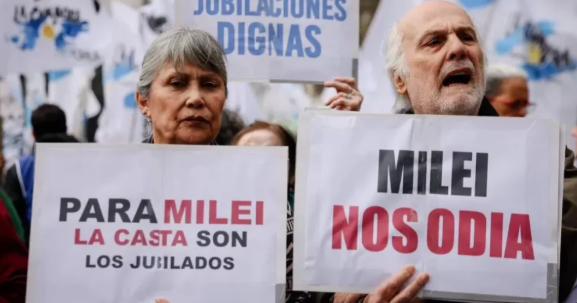The World in Focus | Analysis column
On Aug. 20 audio recordings came out in which Diego Spagnuolo, then-director of the National Disability Agency (ANDIS), discusses a bribery scheme involving the ANDIS government purchase of medicines with an unidentified person. The audios implicate Karina Milei—secretary general of the presidency, sister, and right-hand of President Javier Milei. The revelations, still not confirmed, were like rubbing salt into the open wound of Argentine society, buffeted by unprecedented economic adjustments.

Public outrage is enormous. Argentines stoically endured the economic adjustment program in the hope that the president’s promise to end inflation and corruption among “the caste” would be fulfilled and that the elite would pay the costs of the adjustment. However, Milei has governed with and for the privileged sectors. He closed the fiscal gap in just two months after taking office, but the costs have been borne by the most vulnerable sectors of society while benefiting financial capital, which has grown to the detriment of the productive economy. Thousands of small and medium-sized enterprises have been forced to close down. Corruption during President Milei’s administration has been systematic since the beginning of his term.
The audio scandal
Acts of corruption began during the election campaign. It is well known that the party, La Libertad Avanza (Freedom Advances Party), charged various fees for candidates running for elective and public office. Karina Milei has been accused of charging money for scheduling appointments with her brother or arranging interviews.
Last February, both Mileis and other members of the inner circle were implicated in a major fraud scandal, related to their direct role in promoting a cryptocurrency ($LIBRA) that targeted 40,000 Argentine and U.S. investors and caused millions in losses to investors. As a result, Milei and his sister Karina are facing an investigation by the Argentine Congress and the Anti-Corruption Office, and the U.S. Department of Justice and the Federal Bureau of Investigation (FBI), entities that received a criminal complaint against the protagonists of the massive fraud.
The latest case of alleged corruption has an even greater impact on society since it involves the agency responsible for designing, coordinating, and executing public policies aimed at people with disabilities. Since Milei took office in December 2023, in line with his libertarian economic policy, the agency has suffered budget cuts and terminated more than 110,000 work disability pensions. However, purchases of medicines from the pharmaceutical company “Suizo Argentina”, which according to the audio recordings centralized sales, increased by 27% over the last year, discounting inflation. Karina Milei, who is said to be the intermediary between ANDIS and government medicine purchases, allegedly routinely demanded a 3% commission, which she recently attempted to raise to 5%.
“I spoke to the president and told him: They’re stealing, you can play dumb, but don’t throw this burden on me. If there’s any trouble and they don’t protect me, I have all of Karina’s WhatsApp messages.” This is one of the phrases from the audio recordings released by the streaming channel Carnaval. The recording also provides details on how the scheme works: “The people at Suizo call the other suppliers and tell them, ‘It’s no longer 5, now you have to put 8 (…) You have to bring it to Suizo Argentina (the pharmaceutical company) and we’ll send it up to the Presidency (…) Karina should get 3 or 4,'”. Spagnuolo is also heard speaking with annoyance about what is happening below him in the ANDIS structure: “They put a guy in charge of everything related to my cash register. He’s a criminal who was in Macri’s administration and when he left, he took the hard drives from the computers. He’s not involved, but all his people are. So, they’re going to ask the lenders for money,” he complains.
The former director of ANDIS, a personal friend and former lawyer of President Milei, and a frequent visitor to the Casa Rosada and the presidential residence, was immediately dismissed from his position and is now in the hands of the justice system. A plea bargain is not ruled out.
After federal judge Sebastián Casanello ordered 16 raids related to the case, in which phones of Spagnuolo and executives of the pharmaceutical company Suizo Argentina were seized, Milei finally spoke out on the scandal. “Everything he [Spagnuolo] says is a lie; we are going to take him to court and prove that he lied,” the president said A money counting machine and several envelopes containing a total of $266,000 and 7 million pesos were found at the home of one of the owners of the pharmaceutical company.
The audio recordings were sent to Mauro Federico, director of the Data Clave program on the Carnaval Stream streaming channel, and are being released daily like episodes of a Netflix series. Argentines are watching with horror, with no end in sight. The government has tried to downplay the scandal, saying that the whole thing is a “staged opera” organized by the opposition Kirchnerism, because “they are terrified of losing the elections”. Argentina will hold elections in the province of Buenos Aires on September 7 to partially renew the legislature–Buenos Aires accounts for almost 40% of the electorate of the federal republic. Midterm legislative elections at the national level will be held Oct.26, in which 24 out of a total of 72 Senate seats and 127 of a total of 257 seats in the Chamber of Deputies will be up for grabs.
On Aug. 30, new recordings were released in which Karina Milei’s voice can be heard at a meeting in the Casa Rosada urging the government’s inner circle to remain united. Although there is nothing compromising in her words, the recording implicitly warned that there are infiltrators within the government. That same day, the director of Data Clave in Caranval said he had handed over all the published recordings to the prosecutor’s office and that what he had shown so far on his program was just the tip of the iceberg.

Economic impact
The most recent acts of corruption have impacted Argentina’s already battered economy. The country risk rating, which never fell significantly, has increased to 830 points, placing the country in third place in Latin America, preceded only by Bolivia and Venezuela. Bank shares and debt securities have fallen, and the peso has devalued against the dollar. Likewise, although inflation has been controlled, it has been increasing in the last three months, and the monthly index for August is estimated to be 2.1%.
The IMF’s enthusiastic projections of 5.5% economic growth for Argentina this year (a rebound effect after a 1.7% decline in 2024 and 1.6% in 2023) have collapsed due to cooling economic activity and sluggish consumption. The first half of 2025 ended with signs of stagnation. The Monthly Economic Activity Estimator (EMAE) for June showed that activity fell 0.7% compared to May. The economic recovery that began in the third quarter of 2024 remained steady until February of this year, but has since stagnated. Annual growth for 2025 is still estimated at 4%, but this will be concentrated in the financial sector.

In Milei’s 18 months in office, the economic program has devastated the wages of retirees, people with disabilities, and public sector employees; defunded health, education, science, and the arts; cut workers’ rights, reduced public works; and destroyed the country’s productive fabric, particularly small and medium-sized enterprises, many of which have close and left thousands unemployed. The promise that the adjustment would fall on the so-called political caste is long gone. Cuts in public spending have been accompanied by tax benefits for the most powerful sectors of the country, including reduction of taxes on luxury cars, reduction of withholdings on agricultural and even mining exports.
As during the Macri administration, the big winners under Milei’s government are large corporations and financial investments, which previously benefited from money laundering, entering the country without any investigation into their origin. Much of this money was converted into pesos and invested in various local financial instruments that pay interest rates of 76%, which, given an estimated inflation rate of between 20% and 30% for 2025, generates a real annual interest rate of close to 50%. This has discouraged productive investment. The carry trade scheme, that involves borrowing money in a low-interest rate currency and investing in stocks and bonds based on a higher interest rate currency, aims to discourage demand for the dollar to prevent it from skyrocketing and impacting inflation. However, this is reaching its limit. Financial analysts estimate that it is better to keep portfolios in dollars and not invest further in the carry trade, implying that they believe the government is on the verge of being unable to repay the pesos and interest.
Despite benefits, foreign direct investment has not increased, rather, it has declined to 2017 levels. Meanwhile, the upper-middle classes and “the caste” has a cheap dollar to travel and shop online, which has led to a significant outflow of foreign currency for tourism and purchases abroad.
The leaders of this economic policy are the same as those in former president Macri’s government. Santiago Caputo was Minister of Finance and President of the Central Bank during Macri’s administration, and is currently Milei’s Minister of Economy. Federico Sturzenegger, then head of the Central Bank, is now Minister of Deregulation and State Transformation.
Public protest against the economic program has been expressed in three general strikes during Milei’s term, and in weekly demonstrations and marches by retirees, who have been beaten by the police to “maintain public order”. Comparatively, during the previous administration led by Alberto Fernández, none of this took place. The Peronist presidential candidate in the 2023 elections, Sergio Massa, Fernández’s Minister of Economy, was just 3 points short of winning the elections in the first round in October 2023 despite Fernández’s mediocre government. If Milei completes his term, he is unlikely to carry over that level of support.
Political impact
According to a study by consulting firms La Sastrería and Trespuntozero conducted after the audio recordings were revealed, President Milei’s popularity, which led the ranking of Argentine political leaders earlier in his administration, has fallen by 8 points to third place, behind Axel Kicillof and Cristina Fernández de Kirchner.
According to the consulting firms, 62.5% believe that the audio recordings reflect serious acts of corruption in the government, while only 32.8% consider it to be a “farce,” as the government claims. When asked “how the Spagnuolo case will influence” the upcoming elections, 37.6% of those who said they voted for the ruling party “still plan to vote for La Libertad Avanza,” while 15.3% of those surveyed responded that they would no longer do so. The study shows a record negative differential in the president’s image since he took office, with the latest poll registering a majority 58.5% negative image to a 38.8% positive image.
Support for the government had already been falling before the audio scandal. Confidence in Javier Milei’s government fell 13.6% in August compared to the previous month, according to the index compiled by the Torcuatto Di Tella University, reaching its lowest level since the beginning of his term. The university also published that the Consumer Confidence Index fell 13.9% compared to July and accumulated a year-on-year decline of 3.7%. This is the worst level recorded by the index since September 2024.
Milei seeks to implement more draconian reforms, so the upcoming elections are crucial to increase the number of legislators who support him in Congress. But the scale of the crisis and public outrage indicate that he will fall short. That’s why Milei, following the “best defense is a good offense” playbook of Donald Trump, Jair Bolsonaro, and Keiko Fujimori, has already raised the spectre of possible electoral fraud. He is also considering filing a criminal complaint for the recording of the audio files to deflect to accusing the opposition of carrying out an operation against him as part of his strategy.
The truth is that Milei has lost the support of Congress in recent votes. Several Libertad Avanza congressmen have left his ranks and the press has turned its back on him. The business sector supports him unenthusiastically, but most seriously, he has lost the streets. Last week, his presidential entourage was prevented from campaigning due to public outrage that resulted in acts of aggression.
International impact
The recorded conversations and videos in Milei’s corruption scandal will have a negative impact on the leaders of far-right allied parties in Latin America and Europe, including Jair Bolsonaro of Brazil, Sebastián Katz of Chile, Rafael López Aliaga of Peru, Santiago Abascal of Spain, Giorgia Meloni of Italy, and Donald Trump, who has praised Milei as his star pupil in the region.
Milei has done everything possible to curry favor with Trump, including joining the United States and Israel to vote against the constitution of two independent states in Palestine and Israel in the United Nations General Assembly, and supporting the U.S. strategy to declare Venezuela a narcoterrorist state and justify military intervention, among other things. In October 2024, in a vote in the United Nations General Assembly calling for an end to the embargo imposed on Cuba since 1962, Milei fired his Foreign Minister Diana Mondino for voting in favor, along with 186 countries, with only one abstention, that of Moldova, and the refusal of the United States and Israel.
in late June, Trump’s nominee for ambassador to Argentina, Christian Lamelas, said during his hearing for approval by the Senate Foreign Relations Committee that “given that Milei is vital to regional stability, he would support his presidency during the midterm elections and during the next term and would work to make the relationship between Argentina and the United States ‘a shining example for the rest of Latin America.’” Lamelas promised an “unprecedented strategic alliance between Buenos Aires and Washington” and praised Javier Milei as a “key player in the region.”
Kristalina Georgieva, managing director of the IMF, also did not come out looking very good, as she made no attempt to hide her interference in Argentina’s internal politics when she opined in late April that “the country is going to elections in October. It is very important that the will for change is not derailed. I would ask Argentina to stay the course.” She added that Argentina faces risks due to the global crisis and warned of the challenges ahead for the economic plan.
There are even splits in libertarian forces over Milei’s economic performance. Three of the five members of the Scientific Council of the Von Mises Institute in Germany resigned July 13 because they disagreed with the creation of a “Commemorative Award in honor of Ludwig von Mises” to be presented to President Javier Milei. They asserted that neither the creation of the award nor the selection of the winner was previously discussed with the Institute’s Scientific Advisory Council.
The three consider Milei’s knowledge of ideas and theories to be superficial, deficient, and lacking in the knowledge necessary to deserve it, and “we can only advise the public not to consider Milei’s statements on economic philosophy to be reliable.”
Among other things, they pointed out that his political record to date is already offset by significant liabilities: such as the expansion of the police state, a foreign policy that is not oriented toward international peace and, therefore, is not a libertarian policy. The resigning members stated that “awarding Javier Milei a Memorial Prize in Honor of Ludwig von Mises therefore has the potential to cause lasting and irreparable damage to the Ludwig von Mises Institute in Germany, as well as to the Austrian School as a whole.”
The release of the audio recordings is the spark that has ignited the unrest of a society that had silently endured the leadership of a suppposed crusader against corruption who would end Argentina’s problems. Today, the country has awakened and finds itself facing a moral, political, and economic crisis with unpredictable consequences.

“The World in Focus” is Ariela Ruiz Caro’s biweekly column for Mira: Feminisms and Democracies. Ariela Ruiz Caro is an economist with a master’s degree in economic integration processes and an international consultant on trade, integration, and natural resources at ECLAC, the Latin American Economic System (SELA), and the Institute for the Integration of Latin America and the Caribbean (INTAL), among others. She has served as an official of the Andean Community, advisor to the Commission of Permanent Representatives of MERCOSUR, and Economic Attaché at the Embassy of Peru in Argentina.



